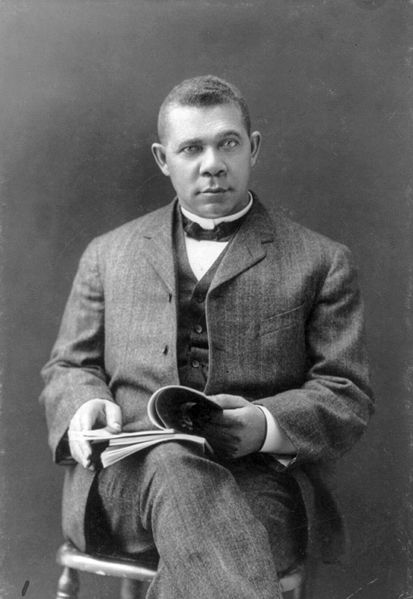“Open the door, get on the floor, everybody walk the dinosaur…”
everyday glory, food for thought, football, geekery, monkeys!, movies and TV, music, news and info, office antics, travel, Whiskey Tango Foxtrot...?! February 23rd, 2010It’s a brisk – but sunny – morning.
Once again, there’s residual achiness from Sunday’s workout. Nothing incapacitating, but it’s there. I’ll hopefully work out the kinks and stretch it out on the next gym excursion.
Meetings! Yay.
Chew on This: Food for Thought – Black History Month
Today’s profile: Booker T. Washington
Booker T. Washington, born Booker Taliaferro, was born in 1856 on the Burroughs tobacco farm (in Virginia) which, despite its small size, he always referred to as a “plantation.” His mother was a cook, his father a white man from a nearby farm. “The early years of my life, which were spent in the little cabin,” he wrote, “were not very different from those of other slaves.”
He went to school in Franklin County – not as a student, but to carry books for one of James Burroughs’s daughters. It was illegal to educate slaves. “I had the feeling that to get into a schoolhouse and study would be about the same as getting into paradise,” he wrote. After emancipation, moved with his family to Malden, W.Va. Dire poverty ruled out regular schooling; at age nine he began working, first in a salt furnace and later in a coal mine. Within a few years, Booker was taken in as a houseboy by a wealthy towns-woman who further encouraged his longing to learn. At age 16, he walked much of the 500 miles back to Virginia to enroll in a new school for black students. He knew that even poor students could get an education at Hampton Institute, paying their way by working. Determined to get an education, he enrolled at the Hampton Normal and Agricultural Institute in Virginia (1872), working as a janitor to help pay expenses. He graduated in 1875 and returned to Malden, where for two years he taught children in a day school and adults at night.
Following studies at Wayland Seminary, Washington, D.C. (1878–79), he joined the staff of Hampton. In 1881, Hampton president Samuel C. Armstrong recommended Washington to become the first leader of Tuskegee Institute, the new normal school (teachers’ college) in Alabama, an institution with two small, converted buildings, no equipment, and very little money. Tuskegee Normal and Industrial Institute became a monument to his life’s work. At his death 34 years later, it had more than 100 well-equipped buildings, some 1,500 students, a faculty of nearly 200 teaching 38 trades and professions, and an endowment of approximately $2,000,000.
Washington the public figure often invoked his own past to illustrate his belief in the dignity of work. “There was no period of my life that was devoted to play,” Washington once wrote. “From the time that I can remember anything, almost everyday of my life has been occupied in some kind of labor.” This concept of self-reliance born of hard work was the cornerstone of Washington’s social philosophy.
Washington received national prominence for his Atlanta Address of 1895, attracting the attention of politicians and the public as a popular spokesperson for African American citizens. Washington built a nationwide network of supporters in many black communities, with black ministers, educators, and businessmen composing his core supporters. Washington played a dominant role in black politics, winning wide support in the black community and among more liberal whites (especially rich northern whites). Many charged that his conservative approach undermined the quest for racial equality. “In all things purely social we can be as separate as the fingers,” he proposed to a biracial audience in his 1895 Atlanta Compromise address, “yet one as the hand in all things essential to mutual progress.” In part, his methods arose for his need for support from powerful whites, some of them former slave owners. It is now known, however, that Washington secretly funded antisegregationist activities.
Despite his travels and widespread work, Washington remained as principal of Tuskegee. Washington’s health deteriorated rapidly; he collapsed in New York City and was brought home to Tuskegee, where he died on November 14, 1915 at the age of 59. The cause of death was unclear, probably from nervous exhaustion and arteriosclerosis. He was buried on the campus of Tuskegee University near the University Chapel.
Stray Toasters
- I Only Hang with Sheepdogs, an item that Perry told me a bout a few months ago. Interesting read.
- Office monkeys! *grblsnrkx*
- From the “Whiskey Tango Foxtrot…?!” file: Wanted: A redesigned hot dog
Are you kidding me!? As SaraRules put it last night, when we saw an item about this on the local news:“Are people really that stupid?! That’s why [parents] cut up the hot dog before feeding it to kids!”
I couldn’t agree more.
And, for my two cents’ worth: The brainchild – or children – behind this fall somewhere between “idiotstick” and “monkey.” - Hollywood movies follow mathematical formula
- The Shortcut Back Into Her Heart

- Abbey Road Studios declared national landmark
- Giant T-Rex Garden Statues

I can’t say that having an eleven-foot-tall T-Rex in your yard wouldn’t be cool, but I’m still partial to having a ‘Mech…
- Owner of Sears, K-Mart to close 21 stores by spring

- …on an oddly related note and also from the “Whiskey Tango Foxtrot…?!” file: Don’t Get Mad, Get Even Send a Bag of Crap
- Resistance is delicious
- Chargers officially cut ties with LaDainian Tomlinson
Namaste.
Leave a Reply
You must be logged in to post a comment.

